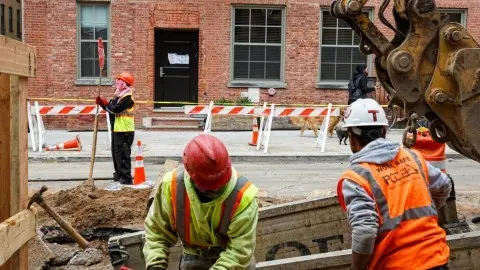Italy: Hung parliament, left without obvious short-run solution to gridlock
Without an outright winner but with a populist twist in parliament, forming a new government will be complicated. Expect tactical positioning by party leaders and clarity about the presidents of the two Houses, before an attempt at a coalition is made
The Italian elections have delivered a hung parliament and based on preliminary data, no party/coalition of parties managed to reach an absolute majority of seats. However, the new political geometry of the Italian parliament that has emerged differs from what opinion polls had suggested on the proportional part of the vote.
According to preliminary data, the Five Star Movement did better than expected, reaching around 32.5% of votes (some 4pps higher than opinion polls). The centre-right coalition's aggregate score was at c.37%, broadly in line with the opinion polls, but the composition diverged substantially, marking a shift of power in favour of the populist Northern League (at c.17.6%) from Forza Italia (c. 14%).
The centre-left front (c. 23%) was the clear loser, scoring some 4pp less than the polls had suggested.
No obvious solution to gridlock
The new geometry of the Italian parliament makes the formation of a new government a very complicated exercise for all players. Poor turnout for the centre-right and centre-left parties suggests the Forza Italia-Democratic Party (PD) core will not be able to forge a grand coalition.
The centre-right coalition, the biggest political aggregate in the new parliament might in principle attempt to build a coalition, but under a Northern League leadership, it might find it hard to attract moderates from the centre-left to reach a majority and strike an agreement. The PD's claim that it would rather be in opposition seems to confirm our doubts.
After such a strong showing, the 5SM is a natural candidate to play a key role in the formation of a new government. However, reaching an alliance agreement with mainstream parties could be very complicated, as the 5SM would likely try to enforce strict preconditions. The possibility of the PD becoming the preferred partner, which cannot be ruled out, might depend heavily on whether PD leader Matteo Renzi decides to resign or not.
In searching for an ally, the 5SM might consider teaming up with the Northern League. While a distinct possibility, this remains unlikely, in our view, as its political viability might be limited, with neither electoral base at ease with the idea.
Expect President Mattarella to keep new elections as a last resort
President Sergio Mattarella will obviously have a big role in the process. We believe he will tread very carefully, exploring all possible solutions to the gridlock and keeping the new elections hypothesis as a last resort with the current electoral system.
We believe he will have to confront the fact that the undisputable victory of populist parties in principle adds a potential bias to future economic policies, and to fiscal policy in particular. Both the Northern League and the 5SM have typically been very critical towards European fiscal rules, deemed too rigid and perceived as an unneeded straightjacket. Pushing for a deviation from the current fiscal trajectory when France and Germany are working towards a new European governance might turn out to be a dangerous exercise.
Should all exploratory mandates fail to succeed, a technocratic solution (or national unity government) with a narrow mandate (such as approving a new electoral law) might ultimately emerge as the backstop outcome.
In our view, in the current setting, a solution to the gridlock will take time to unfold. Party leaders are tactically taking time, well aware that the road to a negotiation is intrinsically long. The new parliament will first gather on 23 March, and the election of the presidents of the two Houses will follow suit. This will be the first relevant test, given possible subsequent alliances.
Only after the presidents are elected, towards the end of March, will president Mattarella start his round of consultations which could result in a mandate.
This publication has been prepared by ING solely for information purposes irrespective of a particular user's means, financial situation or investment objectives. The information does not constitute investment recommendation, and nor is it investment, legal or tax advice or an offer or solicitation to purchase or sell any financial instrument. Read more
Tags
ItalyDownload
Download article
5 March 2018
Week in Review: Economics trumps politics This bundle contains 5 Articles